24 nov 2018
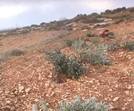
A group of illegal Israeli colonialist settlers invaded, Saturday, a Palestinian olive orchard in the Seder area, in Turmus Ayya village, northeast of the central West Bank city of Ramallah, and uprooted dozens of olive trees.
The colonists invaded the Palestinian orchard and cut the trees although the land is just a few meters away from an Israeli military observation post overlooking it and the surrounding areas, media sources said.
They added that the farmers filed a complaint with the Israeli army and police, and that the soldiers were already in the invaded lands when the Palestinian owners arrived and saw the damage.
Such attacks and violations against the Palestinian lands have been seriously escalating, while the military fails to apprehend or conduct a serious investigation into the ongoing assaults.
The violations carried out by the illegal colonialist setters include cutting, uprooting and burning trees, flooding orchards and farmlands with wastewater, in addition to attacks against the Palestinians, their homes and cars, in addition to racist graffiti and the defacing of graveyards and holy sites, including, burning or attempting to burn mosque and churches.
The colonists invaded the Palestinian orchard and cut the trees although the land is just a few meters away from an Israeli military observation post overlooking it and the surrounding areas, media sources said.
They added that the farmers filed a complaint with the Israeli army and police, and that the soldiers were already in the invaded lands when the Palestinian owners arrived and saw the damage.
Such attacks and violations against the Palestinian lands have been seriously escalating, while the military fails to apprehend or conduct a serious investigation into the ongoing assaults.
The violations carried out by the illegal colonialist setters include cutting, uprooting and burning trees, flooding orchards and farmlands with wastewater, in addition to attacks against the Palestinians, their homes and cars, in addition to racist graffiti and the defacing of graveyards and holy sites, including, burning or attempting to burn mosque and churches.
23 nov 2018
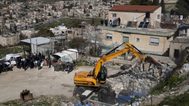
by Sandy Tolan
Since the 2014 war, Mousa Hillah, known to neighbours and family as Abu Ali, has had far bigger worries, which are etched deeply into the exhausted face of the 48-year-old grandfather.
Dodging shell fire from Israeli tanks, he fled with his family from the destruction of his Shuja’eyya neighbourhood, flattened by Israel in an attack so devastating – 7,000 shells in barely an hour – that it astonished even US military officials. (“Holy bejeezus!” one retired general exclaimed.)
The family took refuge for months in an in-law’s house near the sea, along with 50 other people. When they returned, Abu Ali found his home – the one he had built after 30 years of working construction in Israel – utterly destroyed.
Brick by board, he rebuilt it, adorning his front entrance, in a dose of biting irony, with repurposed tank shells.
Facts
UN: more than 95% of Gaza water is undrinkable.
Israeli occupation prevents entry of digging equipment to Gaza so that Gazans cannot dig deep to get clean water.
Salinity has been sharply increasing since the start of Israeli punitive measures on Gaza.And now, as he sits in the filtered morning light beneath a lattice of grape leaves, he worries less about potable water than the Israeli drone buzzing overhead – often the harbinger of another attack.
God forbid if the military on either side, Israel or Egypt, starts shooting people approaching the fence, desperate for clean water.
Gidon Bromberg, director of Ecopeace Middle East in Tel Aviv, said: “I want to sleep well,” Abu Ali says, as his family takes refuge inside the rebuilt house. “I don’t feel safe in my home.”
So the brackish, undrinkable water that sputters from his tap, or the sweet water with possible faecal contamination in his rooftop tank: these are issues Abu Ali files under the category of extreme nuisance.
This very morning, for example, the electricity came on only from 6:30 to 8:30.
It shut off before the water delivery truck arrived – “too late to pump the water to the roof,” Abu Ali complains.
A shortage of drinking water is a major concern, but clearly, worrying about the buzzing drone takes priority.
Gaza’s water catastrophe
Yet if the Gaza Strip truly becomes “uninhabitable” by 2020, as the UN and humanitarian groups warn, it will be largely because of the utter collapse of the system for delivering safe drinking water and properly disposing of disease-causing sewage.
Because of Gaza’s water and sewage catastrophe, medical experts are now seeing sharp increases in waterborne and foodborne diseases, including gastroenteritis, severe diarrhoea, salmonella, typhoid fever, an “alarming magnitude” of stunting in young children, and even something called “blue baby syndrome.”
Independent, peer-reviewed medical studies also document an alarming rise in anaemia and infant mortality. And doctors in Gaza’s hospitals now report increased cases of paediatric cancer.
For years these torments seemed sealed off from the outside world by layers of fences, locked gates, patrolling Israeli drones and warplanes, and international disdain and indifference.
Now, finally, from Washington to European capitals, and even to the Israeli security infrastructure in Tel Aviv, alarm bells are going off, warning that something must be done to prevent the water catastrophe in Gaza from spinning out of control.
“If you really want to change the lives of people, you have to solve the water issue first,” says Adnan Abu Hasna, Gaza spokesperson for the UN Palestinian refugee agency, UNRWA.
How did the water crisis begin?
The crisis essentially began with the creation of Israel in 1948, when hundreds of thousands of Palestinians were driven from their towns and villages and the population of Gaza quadrupled in a matter of weeks.
Now, three-quarters of Gaza’s two million people are refugees. Their descendants put immense pressure on Gaza’s aquifer, drawing it down so far that seawater is flowing in.
What is increasing the pressure on the aquifer are the billions of gallons pumped by Gaza’s now debilitated citrus industry, and the billions more by Gaza’s Israeli settlers, who helped drain a sweet pocket of Gaza water before Israel removed them in 2005.
Now, barely three percent of Gaza’s drinking water wells are fit for human consumption.
The aquifer is badly contaminated with disease-causing nitrates from pesticide use, and from sewage which flows freely as Gaza’s sewage plant is shut down for lack of electricity.
And the desalinated drinking water used by two-thirds of Gazans, according to tests by the Palestinian Water Authority, is prone to faecal contamination, causing more disease and making it a severe risk for Gaza’s children.
Israel’s bombing of water delivery infrastructure – including wells, water towers and pipelines, and sewage plants – in the 2014 war, made matters much worse.
A comprehensive peace deal, in theory, could have eliminated the challenges by connecting Gaza to the West Bank, where the vast Mountain Aquifer is big enough to drown Gaza’s water crisis.
As it is, there is no peace. The two territories are splintered, and Israel has effective control over all of the water – from the Jordan River to the Mediterranean.
As a health epidemic looms, experts, politicians, humanitarian officials and ordinary Gazans are left to debate the best way out of Gaza’s water catastrophe.
‘Stolen by the Israelis’
“We have 15 percent of our water resources, and the rest is stolen by the Israelis,” says Mazen Al Banna, deputy minister for the Hamas government’s water authority.
As he speaks, the wail of an ambulance and a slow mournful dirge pass by the minister’s Gaza City office – a memorial for three Gazans killed in Israeli air attacks the previous day.
Decades ago, Israel captured the Jordan River, directing much of its flow into Israel’s National Water Carrier.
Equally important, it controls the Mountain Aquifer, exercising its power under the Oslo accords to prohibit Palestinians from drilling wells – even though the aquifer lies almost entirely beneath the West Bank.
“And this is against international law,” says Al Banna. “I’m talking about Palestinian water rights. It is very important.”
Yet arguing for Palestinian water rights is akin to debating the right of return for Palestinian refugees. It may be inscribed in international law, but it remains a distant and faltering prospect within the current political reality.
Instead, Hamas ministers and everyone else in Gaza must contend with Israel’s ongoing economic siege, which has restricted the movement of basic goods, including medical supplies and crucial parts for water infrastructure.
“Occupation and siege are the primary impediments to the successful promotion of public health in the Gaza Strip,” declared a 2018 study in the Lancet, which cited “significant and deleterious effects to health care.”
According to a 2017 report by the Israeli human rights group B’tselem: “During the siege, the health system has further deteriorated due to the lack of medical equipment, medicines, and rescue vehicles, and because of the frequent, prolonged power blackouts.”
The Israeli siege sharply restricts the movement of people and materials to and from Gaza – including “dual use” materials it claims could serve both civilian and military purposes.
This is a direct reason why nearly half the population is unemployed, and an increasing number of Gazans – now more than three-quarters of the population – are dependent on humanitarian aid.
The blockade has also delayed the entry of vital water infrastructure – in some cases, for years at a time.
A proposed desalination plant for Gaza City, for example – one of a series of proposed plants – has been delayed since 2010 because of dual-use restrictions.
“Eight years,” says Yasmin Bashir, project coordinator for Gaza’s Coastal Municipal Water Utility. “We got the funding in 2012. This plant is supposed to serve the people who are suffering from bad quality, high salinity water.”
For years Bashir continued to submit “a long list” of material for Israeli approval, including pipes, pumps, and spare parts for the desalination plant.
“But because of the blockade and frequent closure, that delayed the material entry into Gaza.”
And that is just one project.
“We manage more than 25 projects nowadays,” Bashir added.
Now, even voices within Israel’s military and security infrastructure are sounding warnings.
According to a 2017 report by Israel’s Institute for National Security Studies, “severe limits on access and movement imposed by Israel and Egypt have hindered post-conflict repair and reconstruction.”
Israel’s long list of dual-use items, according to the report, “includes 23 essential items” needed for Gaza’s WASH sector (water, sewage and hygiene), “such as pumps, drilling equipment, and chemicals for water purification.”
Is desalination the solution?
A consensus is now emerging between the Palestinian Authority, the UN, international donors, and even, it appears, the Israeli army, to establish a network of large desalination and sewage plants.
This solution carries an, at least, 500 million euro price tag, and is years away from operation, at best – if it’s ever built.
“Of course Gaza needs this project,” says Rebhi al Sheikh, former deputy minister for the Ramallah-based Palestinian Water Authority.
Others criticise the large, expensive development solution as inappropriate technology for an impoverished population that would struggle to afford desalinated water.
“The fantastic plans,” says Ramallah-based German hydrologist Clemens Messerschmid, fail to account for the fact that “Gaza can’t afford it. You just start crying if you look at the GDP.”
He argues that outside contractors, including in Israel, would be the biggest beneficiaries of the desalination scheme.
Perhaps more to the point, says Messerschmid, the amount of water to be produced by the plant won’t ultimately meet Gaza’s needs.
“You don’t reach these quantities under realistic conditions in Gaza.”
Yet the desalination plan appears to be gaining momentum.
The PA’s concerns about Gaza’s water crisis are joined by humanitarian agencies, foreign governments, and even, it appears, an emergency response committee of the Israeli army.
In a Gaza Emergency Response document circulated to unnamed “Friends and Colleagues,” the Israeli army calls for “an immediate humanitarian response” to “enhance the energy supply” and “increase the access to potable water” in Gaza.
Despite the desalination push, a pilot plant in southern Gaza barely operates.
A midday visit in late summer revealed a quiet plant; birds were chirping in the rafters above the idle plant floor: no power.
“We don’t have more than four hours these days,” said plant manager Kamal Abu Moamar. “But we hope.”
He is waiting for his superiors, PA ministers to solve the problem. “But we don’t know how or when.”
Even if the plants are built, there’s no guarantee they would remain standing. Some officials question whether Israel would decide to bomb the desalination plants in the next Gaza war, just as it bombed Gaza’s power plant and other critical infrastructure in previous wars.
“Nobody can tell Israel that you are doing the wrong thing,” says Hamas’s Al Banna. “Israel is doing everything against international law but nobody can prevent Israel doing everything she wants to do.”
In the “Emergency Response” document, the Israel army endorses the Gaza desalination plan, but so far has offered no guarantees it wouldn’t target these plants in the next war.
Al Jazeera contacted an Israeli army spokesman a dozen times, but did not receive a response by time the of publishing.
So the question came to Gregor von Medeazza, a UNICEF water and sanitation expert working in Gaza: Under the circumstances, is investing hundreds of millions in donor funds wasn’t too big a risk?
“Any infrastructure is a risk” he said, “[But] what is the way forward?”
Beyond Gaza’s borders
Other risks abound, both with Gaza’s water and its sewage, which flows into the sea at a rate of 110 million litres a day.
These risks flow well beyond Gaza’s borders, flowing north in the currents.
Gidon Bromberg, director of Ecopeace Middle East, based in Tel Aviv, said Gaza sewage led to the closure of Israeli beaches, and even at one point the shutdown of the desalination plant in Ashkelon, which supplies Israel with 15 percent of its drinking water.
Bromberg says Israelis cannot continue to ignore the humanitarian disaster in Gaza.
He called it “a ticking time bomb”, and warned of an outbreak of pandemic disease – a direct consequence of Gaza’s contaminated water.
If that happens, Bromberg says, Gazans could flock to the fence on Israel’s border – not “with stones or rockets,” but “with buckets”, demanding clean water.
“God forbid if the military on either side, Israel or Egypt, starts shooting people approaching the fence, desperate for clean water.”
~ Al Jazeera/Days of Palestine
This article is the second of a two-part series on Gaza’s water crisis. The first, which examines Gaza’s water and health catastrophe, has been previously published.
Since the 2014 war, Mousa Hillah, known to neighbours and family as Abu Ali, has had far bigger worries, which are etched deeply into the exhausted face of the 48-year-old grandfather.
Dodging shell fire from Israeli tanks, he fled with his family from the destruction of his Shuja’eyya neighbourhood, flattened by Israel in an attack so devastating – 7,000 shells in barely an hour – that it astonished even US military officials. (“Holy bejeezus!” one retired general exclaimed.)
The family took refuge for months in an in-law’s house near the sea, along with 50 other people. When they returned, Abu Ali found his home – the one he had built after 30 years of working construction in Israel – utterly destroyed.
Brick by board, he rebuilt it, adorning his front entrance, in a dose of biting irony, with repurposed tank shells.
Facts
UN: more than 95% of Gaza water is undrinkable.
Israeli occupation prevents entry of digging equipment to Gaza so that Gazans cannot dig deep to get clean water.
Salinity has been sharply increasing since the start of Israeli punitive measures on Gaza.And now, as he sits in the filtered morning light beneath a lattice of grape leaves, he worries less about potable water than the Israeli drone buzzing overhead – often the harbinger of another attack.
God forbid if the military on either side, Israel or Egypt, starts shooting people approaching the fence, desperate for clean water.
Gidon Bromberg, director of Ecopeace Middle East in Tel Aviv, said: “I want to sleep well,” Abu Ali says, as his family takes refuge inside the rebuilt house. “I don’t feel safe in my home.”
So the brackish, undrinkable water that sputters from his tap, or the sweet water with possible faecal contamination in his rooftop tank: these are issues Abu Ali files under the category of extreme nuisance.
This very morning, for example, the electricity came on only from 6:30 to 8:30.
It shut off before the water delivery truck arrived – “too late to pump the water to the roof,” Abu Ali complains.
A shortage of drinking water is a major concern, but clearly, worrying about the buzzing drone takes priority.
Gaza’s water catastrophe
Yet if the Gaza Strip truly becomes “uninhabitable” by 2020, as the UN and humanitarian groups warn, it will be largely because of the utter collapse of the system for delivering safe drinking water and properly disposing of disease-causing sewage.
Because of Gaza’s water and sewage catastrophe, medical experts are now seeing sharp increases in waterborne and foodborne diseases, including gastroenteritis, severe diarrhoea, salmonella, typhoid fever, an “alarming magnitude” of stunting in young children, and even something called “blue baby syndrome.”
Independent, peer-reviewed medical studies also document an alarming rise in anaemia and infant mortality. And doctors in Gaza’s hospitals now report increased cases of paediatric cancer.
For years these torments seemed sealed off from the outside world by layers of fences, locked gates, patrolling Israeli drones and warplanes, and international disdain and indifference.
Now, finally, from Washington to European capitals, and even to the Israeli security infrastructure in Tel Aviv, alarm bells are going off, warning that something must be done to prevent the water catastrophe in Gaza from spinning out of control.
“If you really want to change the lives of people, you have to solve the water issue first,” says Adnan Abu Hasna, Gaza spokesperson for the UN Palestinian refugee agency, UNRWA.
How did the water crisis begin?
The crisis essentially began with the creation of Israel in 1948, when hundreds of thousands of Palestinians were driven from their towns and villages and the population of Gaza quadrupled in a matter of weeks.
Now, three-quarters of Gaza’s two million people are refugees. Their descendants put immense pressure on Gaza’s aquifer, drawing it down so far that seawater is flowing in.
What is increasing the pressure on the aquifer are the billions of gallons pumped by Gaza’s now debilitated citrus industry, and the billions more by Gaza’s Israeli settlers, who helped drain a sweet pocket of Gaza water before Israel removed them in 2005.
Now, barely three percent of Gaza’s drinking water wells are fit for human consumption.
The aquifer is badly contaminated with disease-causing nitrates from pesticide use, and from sewage which flows freely as Gaza’s sewage plant is shut down for lack of electricity.
And the desalinated drinking water used by two-thirds of Gazans, according to tests by the Palestinian Water Authority, is prone to faecal contamination, causing more disease and making it a severe risk for Gaza’s children.
Israel’s bombing of water delivery infrastructure – including wells, water towers and pipelines, and sewage plants – in the 2014 war, made matters much worse.
A comprehensive peace deal, in theory, could have eliminated the challenges by connecting Gaza to the West Bank, where the vast Mountain Aquifer is big enough to drown Gaza’s water crisis.
As it is, there is no peace. The two territories are splintered, and Israel has effective control over all of the water – from the Jordan River to the Mediterranean.
As a health epidemic looms, experts, politicians, humanitarian officials and ordinary Gazans are left to debate the best way out of Gaza’s water catastrophe.
‘Stolen by the Israelis’
“We have 15 percent of our water resources, and the rest is stolen by the Israelis,” says Mazen Al Banna, deputy minister for the Hamas government’s water authority.
As he speaks, the wail of an ambulance and a slow mournful dirge pass by the minister’s Gaza City office – a memorial for three Gazans killed in Israeli air attacks the previous day.
Decades ago, Israel captured the Jordan River, directing much of its flow into Israel’s National Water Carrier.
Equally important, it controls the Mountain Aquifer, exercising its power under the Oslo accords to prohibit Palestinians from drilling wells – even though the aquifer lies almost entirely beneath the West Bank.
“And this is against international law,” says Al Banna. “I’m talking about Palestinian water rights. It is very important.”
Yet arguing for Palestinian water rights is akin to debating the right of return for Palestinian refugees. It may be inscribed in international law, but it remains a distant and faltering prospect within the current political reality.
Instead, Hamas ministers and everyone else in Gaza must contend with Israel’s ongoing economic siege, which has restricted the movement of basic goods, including medical supplies and crucial parts for water infrastructure.
“Occupation and siege are the primary impediments to the successful promotion of public health in the Gaza Strip,” declared a 2018 study in the Lancet, which cited “significant and deleterious effects to health care.”
According to a 2017 report by the Israeli human rights group B’tselem: “During the siege, the health system has further deteriorated due to the lack of medical equipment, medicines, and rescue vehicles, and because of the frequent, prolonged power blackouts.”
The Israeli siege sharply restricts the movement of people and materials to and from Gaza – including “dual use” materials it claims could serve both civilian and military purposes.
This is a direct reason why nearly half the population is unemployed, and an increasing number of Gazans – now more than three-quarters of the population – are dependent on humanitarian aid.
The blockade has also delayed the entry of vital water infrastructure – in some cases, for years at a time.
A proposed desalination plant for Gaza City, for example – one of a series of proposed plants – has been delayed since 2010 because of dual-use restrictions.
“Eight years,” says Yasmin Bashir, project coordinator for Gaza’s Coastal Municipal Water Utility. “We got the funding in 2012. This plant is supposed to serve the people who are suffering from bad quality, high salinity water.”
For years Bashir continued to submit “a long list” of material for Israeli approval, including pipes, pumps, and spare parts for the desalination plant.
“But because of the blockade and frequent closure, that delayed the material entry into Gaza.”
And that is just one project.
“We manage more than 25 projects nowadays,” Bashir added.
Now, even voices within Israel’s military and security infrastructure are sounding warnings.
According to a 2017 report by Israel’s Institute for National Security Studies, “severe limits on access and movement imposed by Israel and Egypt have hindered post-conflict repair and reconstruction.”
Israel’s long list of dual-use items, according to the report, “includes 23 essential items” needed for Gaza’s WASH sector (water, sewage and hygiene), “such as pumps, drilling equipment, and chemicals for water purification.”
Is desalination the solution?
A consensus is now emerging between the Palestinian Authority, the UN, international donors, and even, it appears, the Israeli army, to establish a network of large desalination and sewage plants.
This solution carries an, at least, 500 million euro price tag, and is years away from operation, at best – if it’s ever built.
“Of course Gaza needs this project,” says Rebhi al Sheikh, former deputy minister for the Ramallah-based Palestinian Water Authority.
Others criticise the large, expensive development solution as inappropriate technology for an impoverished population that would struggle to afford desalinated water.
“The fantastic plans,” says Ramallah-based German hydrologist Clemens Messerschmid, fail to account for the fact that “Gaza can’t afford it. You just start crying if you look at the GDP.”
He argues that outside contractors, including in Israel, would be the biggest beneficiaries of the desalination scheme.
Perhaps more to the point, says Messerschmid, the amount of water to be produced by the plant won’t ultimately meet Gaza’s needs.
“You don’t reach these quantities under realistic conditions in Gaza.”
Yet the desalination plan appears to be gaining momentum.
The PA’s concerns about Gaza’s water crisis are joined by humanitarian agencies, foreign governments, and even, it appears, an emergency response committee of the Israeli army.
In a Gaza Emergency Response document circulated to unnamed “Friends and Colleagues,” the Israeli army calls for “an immediate humanitarian response” to “enhance the energy supply” and “increase the access to potable water” in Gaza.
Despite the desalination push, a pilot plant in southern Gaza barely operates.
A midday visit in late summer revealed a quiet plant; birds were chirping in the rafters above the idle plant floor: no power.
“We don’t have more than four hours these days,” said plant manager Kamal Abu Moamar. “But we hope.”
He is waiting for his superiors, PA ministers to solve the problem. “But we don’t know how or when.”
Even if the plants are built, there’s no guarantee they would remain standing. Some officials question whether Israel would decide to bomb the desalination plants in the next Gaza war, just as it bombed Gaza’s power plant and other critical infrastructure in previous wars.
“Nobody can tell Israel that you are doing the wrong thing,” says Hamas’s Al Banna. “Israel is doing everything against international law but nobody can prevent Israel doing everything she wants to do.”
In the “Emergency Response” document, the Israel army endorses the Gaza desalination plan, but so far has offered no guarantees it wouldn’t target these plants in the next war.
Al Jazeera contacted an Israeli army spokesman a dozen times, but did not receive a response by time the of publishing.
So the question came to Gregor von Medeazza, a UNICEF water and sanitation expert working in Gaza: Under the circumstances, is investing hundreds of millions in donor funds wasn’t too big a risk?
“Any infrastructure is a risk” he said, “[But] what is the way forward?”
Beyond Gaza’s borders
Other risks abound, both with Gaza’s water and its sewage, which flows into the sea at a rate of 110 million litres a day.
These risks flow well beyond Gaza’s borders, flowing north in the currents.
Gidon Bromberg, director of Ecopeace Middle East, based in Tel Aviv, said Gaza sewage led to the closure of Israeli beaches, and even at one point the shutdown of the desalination plant in Ashkelon, which supplies Israel with 15 percent of its drinking water.
Bromberg says Israelis cannot continue to ignore the humanitarian disaster in Gaza.
He called it “a ticking time bomb”, and warned of an outbreak of pandemic disease – a direct consequence of Gaza’s contaminated water.
If that happens, Bromberg says, Gazans could flock to the fence on Israel’s border – not “with stones or rockets,” but “with buckets”, demanding clean water.
“God forbid if the military on either side, Israel or Egypt, starts shooting people approaching the fence, desperate for clean water.”
~ Al Jazeera/Days of Palestine
This article is the second of a two-part series on Gaza’s water crisis. The first, which examines Gaza’s water and health catastrophe, has been previously published.
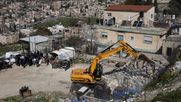
Israeli forces have continued carrying out demolition procedures on Palestinian homes, this week, beginning on Wednesday, with the destruction of several shops in the Shu’fat neighborhood of East Jerusalem, a major center for the city’s refugee population.
Dozens of Israeli soldiers also invaded, on Wednesday, scores of Palestinian homes and shops in Deir al-Ghosoun town, north of the northern West Bank city of Tulkarem, after detonating their doors, firing many flares, gas bombs and concussion grenades.
Israeli forces stormed Duma village, south of the northern occupied West Bank district of Nablus, on the same day, and demolished a Palestinian home under the pretext that it was built without the difficult-to-obtain Israeli permit.
The following day, Israeli bulldozers demolished a Palestinian-owned family home, workshop, and a structure, in Rahat town of the Negev Desert region in southern Israel, under the pretext that the structure was built without the difficult-to-obtain Israeli permit.
According to Ma’an sources, Israeli forces came with bulldozers and stormed the area, closed all main streets, preventeing residents from reaching the area.
Sources said that Israeli bulldozers completely demolished three structures, including a family home.
The Israeli government has plans to evacuate thousands of Bedouin residents to officially recognized Bedouin townships, one of which is Rahat, in order to build new housing on the evacuated land for non-Bedouin Israeli citizens.
According to Israeli human rights group Adalah, the plan would “result in the destruction of 35 ‘unrecognized’’ Arab Bedouin villages, the forced displacement of up to 70,000 Arab Bedouin citizens of Israel, and the dispossession of their historical lands in the Negev.”
Bedouin communities in the Negev have been the target of a heightened demolition campaign in recent weeks, following Israeli leaders publicly expressing their commitment to demolish Palestinian structures lacking difficult to obtain Israeli-issued building permits across Israel and occupied East Jerusalem in response to the Israeli-court sanctioned evacuation of the illegal Amona settler outpost in 2017.
Dozens of Israeli soldiers also invaded, on Wednesday, scores of Palestinian homes and shops in Deir al-Ghosoun town, north of the northern West Bank city of Tulkarem, after detonating their doors, firing many flares, gas bombs and concussion grenades.
Israeli forces stormed Duma village, south of the northern occupied West Bank district of Nablus, on the same day, and demolished a Palestinian home under the pretext that it was built without the difficult-to-obtain Israeli permit.
The following day, Israeli bulldozers demolished a Palestinian-owned family home, workshop, and a structure, in Rahat town of the Negev Desert region in southern Israel, under the pretext that the structure was built without the difficult-to-obtain Israeli permit.
According to Ma’an sources, Israeli forces came with bulldozers and stormed the area, closed all main streets, preventeing residents from reaching the area.
Sources said that Israeli bulldozers completely demolished three structures, including a family home.
The Israeli government has plans to evacuate thousands of Bedouin residents to officially recognized Bedouin townships, one of which is Rahat, in order to build new housing on the evacuated land for non-Bedouin Israeli citizens.
According to Israeli human rights group Adalah, the plan would “result in the destruction of 35 ‘unrecognized’’ Arab Bedouin villages, the forced displacement of up to 70,000 Arab Bedouin citizens of Israel, and the dispossession of their historical lands in the Negev.”
Bedouin communities in the Negev have been the target of a heightened demolition campaign in recent weeks, following Israeli leaders publicly expressing their commitment to demolish Palestinian structures lacking difficult to obtain Israeli-issued building permits across Israel and occupied East Jerusalem in response to the Israeli-court sanctioned evacuation of the illegal Amona settler outpost in 2017.
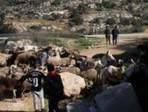
Israeli soldiers detained, Friday, three Palestinian shepherds in the al-Farisiyya area, in the West Bank’s Northern Plains.
Media sources said the two shepherds took their livestock to a Palestinian grazing area, east of the al-Farisiyya area.
They said the soldiers attacked the three shepherds, identified as Hilal, Daraghma, Kamal Daraghma, and Jasser Qadri Daraghma.
It is worth mentioning that the army frequently attacks Palestinian shepherd and farmers in the area, in addition to numerous violations by illegal colonialist settlers.
Media sources said the two shepherds took their livestock to a Palestinian grazing area, east of the al-Farisiyya area.
They said the soldiers attacked the three shepherds, identified as Hilal, Daraghma, Kamal Daraghma, and Jasser Qadri Daraghma.
It is worth mentioning that the army frequently attacks Palestinian shepherd and farmers in the area, in addition to numerous violations by illegal colonialist settlers.
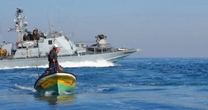
The Israeli occupation forces (IOF) on Friday morning kidnapped three Palestinian fishermen and confiscated their boat off the northern coast of the besieged Gaza Strip.
A local committee documenting Israeli violations against Gaza fishermen said that an Israeli naval force kidnapped the fishermen, Mohamed al-Sultan, 27, Yousef Saadallah, 35, and Ahmed Saadallah, 25.
The committee added that Israeli gunboats intensively opened fire at the boat the fishermen were aboard off the shores of al-Sudaniya area in northern Gaza before rounding them up and towing their boat to an Israeli port.
Israeli gunboats are around Gaza fishermen almost every day, harassing them, shooting at them, damaging their boats, and making arrests. Sometimes fishermen are injured or killed during gunfire attacks.
Under the 1993 Oslo accords, Palestinian fishermen are permitted to fish up to 20 nautical miles off the coast of Gaza, but since then Israel has kept reducing the fishing area gradually to a limit of three nautical miles as part of its blockade on Gaza.
Fishermen and human rights groups also say that, since the 2008-09 war in Gaza, the Israeli army has been regularly enforcing a limit even closer to the shore.
A local committee documenting Israeli violations against Gaza fishermen said that an Israeli naval force kidnapped the fishermen, Mohamed al-Sultan, 27, Yousef Saadallah, 35, and Ahmed Saadallah, 25.
The committee added that Israeli gunboats intensively opened fire at the boat the fishermen were aboard off the shores of al-Sudaniya area in northern Gaza before rounding them up and towing their boat to an Israeli port.
Israeli gunboats are around Gaza fishermen almost every day, harassing them, shooting at them, damaging their boats, and making arrests. Sometimes fishermen are injured or killed during gunfire attacks.
Under the 1993 Oslo accords, Palestinian fishermen are permitted to fish up to 20 nautical miles off the coast of Gaza, but since then Israel has kept reducing the fishing area gradually to a limit of three nautical miles as part of its blockade on Gaza.
Fishermen and human rights groups also say that, since the 2008-09 war in Gaza, the Israeli army has been regularly enforcing a limit even closer to the shore.
22 nov 2018
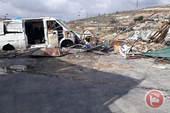
Israeli bulldozers demolished a Palestinian-owned family home, workshop, and a structure, on Thursday, in Rahat town in Negev, in southern Israel, under the pretext that the structure was built without the difficult-to-obtain Israeli permit.
According to local sources, Israeli forces along with bulldozers stormed the area, closed all main streets, and prevented residents from reaching the area.
Sources said that Israeli bulldozers completely demolished three structures, including a family home.
The Israeli government has plans to evacuate thousands of Bedouin residents to officially recognized Bedouin townships, one of which is Rahat, in order to build new housing on the evacuated land for non-Bedouin Israeli citizens.
According to Israeli human rights group Adalah, the plan would "result in the destruction of 35 'unrecognized’' Arab Bedouin villages, the forced displacement of up to 70,000 Arab Bedouin citizens of Israel, and the dispossession of their historical lands in the Negev."
Bedouin communities in the Negev have been the target of a heightened demolition campaign in recent weeks, following Israeli leaders publicly expressing their commitment to demolish Palestinian structures lacking difficult to obtain Israeli-issued building permits across Israel and occupied East Jerusalem in response to the Israeli-court sanctioned evacuation of the illegal Amona settler outpost in 2017.
According to local sources, Israeli forces along with bulldozers stormed the area, closed all main streets, and prevented residents from reaching the area.
Sources said that Israeli bulldozers completely demolished three structures, including a family home.
The Israeli government has plans to evacuate thousands of Bedouin residents to officially recognized Bedouin townships, one of which is Rahat, in order to build new housing on the evacuated land for non-Bedouin Israeli citizens.
According to Israeli human rights group Adalah, the plan would "result in the destruction of 35 'unrecognized’' Arab Bedouin villages, the forced displacement of up to 70,000 Arab Bedouin citizens of Israel, and the dispossession of their historical lands in the Negev."
Bedouin communities in the Negev have been the target of a heightened demolition campaign in recent weeks, following Israeli leaders publicly expressing their commitment to demolish Palestinian structures lacking difficult to obtain Israeli-issued building permits across Israel and occupied East Jerusalem in response to the Israeli-court sanctioned evacuation of the illegal Amona settler outpost in 2017.
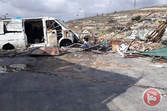
Israeli forces raided the Nabi Younis neighborhood, north of the southern occupied West Bank city of Hebron, and demolished a Palestinian carwash, on Thursday.
The owner of the demolished carwash, Muhammad Hussein Muraab, told Ma'an that Israeli forces raided the Nabi Younis neighborhood and completely demolished his carwash.
Muraab also mentioned that Israeli forces confiscated all the equipment from the carwash prior to demolishing it.
Muraab added that Israeli forces did not provide a reason for the demolition.
The owner of the demolished carwash, Muhammad Hussein Muraab, told Ma'an that Israeli forces raided the Nabi Younis neighborhood and completely demolished his carwash.
Muraab also mentioned that Israeli forces confiscated all the equipment from the carwash prior to demolishing it.
Muraab added that Israeli forces did not provide a reason for the demolition.
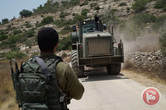
Israeli settlers razed dozens of dunams of Palestinian-owned agricultural land between the illegal Israeli settlements of Maskyot and Rotem, in the northern Jordan Valley, on Wednesday.
Human rights activist, Aref Daragmeh, said that Israeli settlers from the illegal Maskyot settlement built a small structure and razed dozen of dunams of agricultural land, particularly used to herd sheep.
Daraghmeh mentioned that Israeli settlers under the protection of Israeli forces regularly raze lands and seal off the area, preventing Palestinian farmers and shepherds from working.
Palestinian residents of the Jordan Valley regularly face evacuations and interruption due to Israeli military exercises on or near their land. The district of Tubas, meanwhile, is one of the occupied West Bank's most important agricultural centers.
The majority of the Jordan Valley is under full Israeli military control, despite being within the West Bank. Meanwhile, at least 44% of the total land in the Jordan Valley has been re-appropriated by Israeli forces for military purposes and training exercises.
Forming a third of the occupied West Bank and with 88 percent of its land classified as Area C, the Jordan Valley has long been a strategic area of land unlikely to return to Palestinians following Israel's occupation in 1967.
Human rights activist, Aref Daragmeh, said that Israeli settlers from the illegal Maskyot settlement built a small structure and razed dozen of dunams of agricultural land, particularly used to herd sheep.
Daraghmeh mentioned that Israeli settlers under the protection of Israeli forces regularly raze lands and seal off the area, preventing Palestinian farmers and shepherds from working.
Palestinian residents of the Jordan Valley regularly face evacuations and interruption due to Israeli military exercises on or near their land. The district of Tubas, meanwhile, is one of the occupied West Bank's most important agricultural centers.
The majority of the Jordan Valley is under full Israeli military control, despite being within the West Bank. Meanwhile, at least 44% of the total land in the Jordan Valley has been re-appropriated by Israeli forces for military purposes and training exercises.
Forming a third of the occupied West Bank and with 88 percent of its land classified as Area C, the Jordan Valley has long been a strategic area of land unlikely to return to Palestinians following Israel's occupation in 1967.
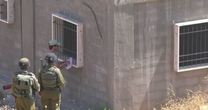
The Israeli occupation forces (IOF) on Wednesday evening handed a Palestinian citizen a stop-work order against an agricultural well in al-Khader town, south of Bethlehem in the West Bank.
Local official Ahmed Salah said that Israeli soldiers gave farmer Mahmoud Ba’rah a written notice ordering him to stop building a well in Wadi Abu Hasan area in the town.
He added that Ba’rah was given until January 3, 2019 to file an objection against the order.
Local official Ahmed Salah said that Israeli soldiers gave farmer Mahmoud Ba’rah a written notice ordering him to stop building a well in Wadi Abu Hasan area in the town.
He added that Ba’rah was given until January 3, 2019 to file an objection against the order.
21 nov 2018
|
|
Israeli soldiers and police officers started, on Wednesday morning, the demolition of many stores in Shu’fat refugee camp, north of occupied East Jerusalem.
Nasser Fasfous, the spokesperson of Fateh Movement in Shu’fat, said dozens of soldiers, officers and employees of the City Council in occupied Jerusalem, stormed the refugee camp, and initiated the demolition of the stores. He added that the stores include a bakery, clothing shops, shoe stores, shops and restaurants, were built in 2007, and City Council in occupied Jerusalem is claiming they did not receive construction permits. video It is worth mentioning that the army only posted the demolition orders, on Tuesday evening, after invading the refugee camp. |

Dozens of Israeli soldiers invaded, on Wednesday at dawn, scores of Palestinian homes and shops in Deir al-Ghosoun town, north of the northern West Bank city of Tulkarem, after detonating their doors, and fired many flares, gas bombs and concussion grenades in several neighborhoods and alleys.
Locals in the town said the invasion was carried out by more than 30 armored Israeli military vehicles, before the soldiers were heavily deployed in various alleys and neighborhoods.
They added that the soldiers detonated the front doors of dozens of homes and stores in the town, before invading them, and initiated extensive and violent searches, leading to further destruction.
The invasions targeted more than fifty homes and stores, while the soldiers also distributed leaflets warning severe punishment, including demolition of property and homes and threatening extended prison sentences against any Palestinian who provides aid to Ashraf Na’alwa.
The soldiers also carried out extensive and violent searches in Bal’a and Ramin towns, east of Tulkarem, in addition to Zeita town, north of the city, including the surrounding farmlands and hills.
Since Na’alwa carried out the fatal shooting in Burkan illegal colony, killing two Israelis, identified as Kim Levengrond Yehezkel, 28, from Rosh HaAyin, and Ziv Hagbi, 35, from Rishon LeZion, and fled the scene, the military started ongoing invasions into his home, and the homes of his relatives along with dozens of homes and property.
The army also frequently abducted and imprisoned members of Ashraf’s family, and issued a demolition order targeting his parent’s home.
Locals in the town said the invasion was carried out by more than 30 armored Israeli military vehicles, before the soldiers were heavily deployed in various alleys and neighborhoods.
They added that the soldiers detonated the front doors of dozens of homes and stores in the town, before invading them, and initiated extensive and violent searches, leading to further destruction.
The invasions targeted more than fifty homes and stores, while the soldiers also distributed leaflets warning severe punishment, including demolition of property and homes and threatening extended prison sentences against any Palestinian who provides aid to Ashraf Na’alwa.
The soldiers also carried out extensive and violent searches in Bal’a and Ramin towns, east of Tulkarem, in addition to Zeita town, north of the city, including the surrounding farmlands and hills.
Since Na’alwa carried out the fatal shooting in Burkan illegal colony, killing two Israelis, identified as Kim Levengrond Yehezkel, 28, from Rosh HaAyin, and Ziv Hagbi, 35, from Rishon LeZion, and fled the scene, the military started ongoing invasions into his home, and the homes of his relatives along with dozens of homes and property.
The army also frequently abducted and imprisoned members of Ashraf’s family, and issued a demolition order targeting his parent’s home.

The Israeli Occupation Forces (IOF) destroyed on Wednesday a Palestinian-owned house south of Nablus, to the north of West Bank.
Local sources told Quds Press that IOF stormed early today Duma town and demolished a house belonging to the local resident Umar al-Sari.
On the other hand, a group of settlers levelled an agricultural land in the Jordan Valley.
Local activist Atef Daraghmah said that settlers of Maskiot settlement bulldozed a Palestinian land located near the illegal outpost.
Nearly all Palestinian applications for building permits in Israeli-controlled Area C are denied by the Israeli authorities, forcing communities to build illegally.
Meanwhile, the estimated 550,000 Jewish Israeli settlers in the occupied Palestinian territory are more easily given building permits and allowed to expand their homes and properties, despite living in settlements that violate international law.
Local sources told Quds Press that IOF stormed early today Duma town and demolished a house belonging to the local resident Umar al-Sari.
On the other hand, a group of settlers levelled an agricultural land in the Jordan Valley.
Local activist Atef Daraghmah said that settlers of Maskiot settlement bulldozed a Palestinian land located near the illegal outpost.
Nearly all Palestinian applications for building permits in Israeli-controlled Area C are denied by the Israeli authorities, forcing communities to build illegally.
Meanwhile, the estimated 550,000 Jewish Israeli settlers in the occupied Palestinian territory are more easily given building permits and allowed to expand their homes and properties, despite living in settlements that violate international law.
Page: 41 - 40 - 39 - 38 - 37 - 36 - 35 - 34 - 33 - 32 - 31 - 30 - 29 - 28 - 27 - 26 - 25 - 24 - 23 - 22 - 21 - 20
